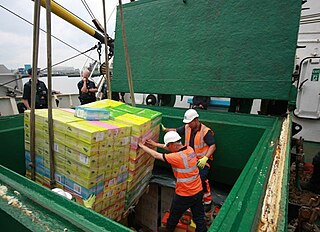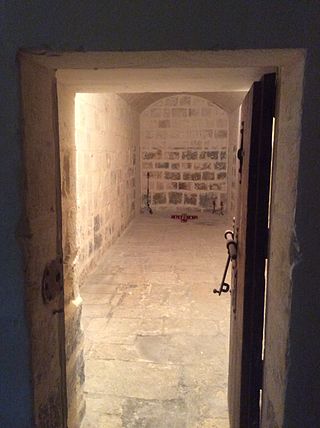
Smuggling is the illegal transportation of objects, substances, information or people, such as out of a house or buildings, into a prison, or across an international border, in violation of applicable laws or other regulations. More broadly, social scientists define smuggling as the purposeful movement across a border in contravention to the relevant legal frameworks.

Safe sex is sexual activity using methods or contraceptive devices to reduce the risk of transmitting or acquiring sexually transmitted infections (STIs), especially HIV. "Safe sex" is also sometimes referred to as safer sex or protected sex to indicate that some safe sex practices do not eliminate STI risks. It is also sometimes used colloquially to describe methods aimed at preventing pregnancy that may or may not also lower STI risks.
A pessary is a prosthetic device inserted into the vagina for structural and pharmaceutical purposes. It is most commonly used to treat stress urinary incontinence to stop urinary leakage and to treat pelvic organ prolapse to maintain the location of organs in the pelvic region. It can also be used to administer medications locally in the vagina or as a method of contraception.

During the early stages of the Iraq War, members of the United States Army and the Central Intelligence Agency committed a series of human rights violations and war crimes against detainees in the Abu Ghraib prison in Iraq, including physical abuse, sexual humiliation, physical and psychological torture, and rape, as well as the killing of Manadel al-Jamadi and the desecration of his body. The abuses came to public attention with the publication of photographs of the abuse by CBS News in April 2004. The incidents caused shock and outrage, receiving widespread condemnation within the United States and internationally.

Concealment devices or diversion safes are used to hide things for the purpose of secrecy or security. They are made from an ordinary household object such as a book, a soda can, a candle, a can, or something as small as a coin. The idea is that such an inconspicuous object would not be expected to contain anything of worth.

A shiv, also chiv, schiv, shivvie, or shank, is a handcrafted bladed-weapon resembling a knife that is commonly associated with prison inmates.

A strip search is a practice of searching a person for weapons or other contraband suspected of being hidden on their body or inside their clothing, and not found by performing a frisk search, but by requiring the person to remove some or all clothing. The search may involve an official performing an intimate person search and inspecting their personal effects and body cavities. A strip search is more intrusive than a frisk and requires legal authority. Regulations covering strip searches vary considerably and may be mandatory in some situations or discretionary in others.
Reasonable suspicion is a legal standard of proof in United States law that is less than probable cause, the legal standard for arrests and warrants, but more than an "inchoate and unparticularized suspicion or 'hunch'"; it must be based on "specific and articulable facts", "taken together with rational inferences from those facts", and the suspicion must be associated with the specific individual. If police additionally have reasonable suspicion that a person so detained is armed and dangerous, they may "frisk" the person for weapons, but not for contraband like drugs. However, if the police develop probable cause during a weapons frisk, they may then conduct a full search. Reasonable suspicion is evaluated using the "reasonable person" or "reasonable officer" standard, in which said person in the same circumstances could reasonably suspect a person has been, is, or is about to be engaged in criminal activity; it depends upon the totality of circumstances, and can result from a combination of particular facts, even if each is individually innocuous.

Prisoner abuse is the mistreatment of persons while they are under arrest or incarcerated. Prisoner abuse can include physical abuse, psychological abuse, sexual abuse, torture, or other acts such as refusal of essential medication, and it can be perpetuated by either fellow inmates or prison faculty.

A mule or courier is someone who personally smuggles contraband across a border for a smuggling organization. The organizers employ mules to reduce the risk of getting caught themselves. Methods of smuggling include hiding the goods in vehicles or carried items, attaching them to one's body, or using the body as a container.
The Malaysian lock-up detainee abuse scandal is a scandal involving the abuse allegations of detainees under the care of the Royal Malaysian Police which occurred in 2005.
Cavity Search may refer to:

Detention is the process whereby a state or private citizen lawfully holds a person by removing their freedom or liberty at that time. This can be due to (pending) criminal charges preferred against the individual pursuant to a prosecution or to protect a person or property. Being detained does not always result in being taken to a particular area, either for interrogation or as punishment for a crime. An individual may be detained due a psychiatric disorder, potentially to treat this disorder involuntarily. They may also be detained for to prevent the spread of infectious diseases such as tuberculosis.
In United States criminal law, the border search exception is a doctrine that allows searches and seizures at international borders and their functional equivalent without a warrant or probable cause. Generally speaking, searches within 100 miles of the border are more permissible without a warrant than those conducted elsewhere in the U.S. The doctrine also allows federal agents to search people at border crossings without a warrant or probable cause. The government is allowed to use scanning devices and to search personal electronics. Invasive bodily searches, however, require reasonable suspicion.
The following outline is provided as an overview of and topical guide to human sexuality:
Florence v. Board of Chosen Freeholders, 566 U.S. 318 (2012), was a United States Supreme Court case in which the Court held that officials may strip-search individuals who have been arrested for any crime before admitting the individuals to jail, even if there is no reason to suspect that the individual is carrying contraband.

In prison terminology a dry cell is a room that prisoners are placed in that lacks any plumbing facilities such as a toilet or shower. In the Federal Bureau of Prisons, a dry cell can be used if a prisoner claims to be unable to urinate for a drug test under direct visual supervision. Prisoners are also sometimes placed in dry cells if they are suspected of having swallowed contraband. The idea is that they will eventually excrete all the contents of their digestive system, and lacking any toilet, they will be unable to dispose of it and thereby prevent prison officials from acquiring the evidence.
In a gunfight, the Bangkok Rules refer to an agreement by all parties not to draw their weapons until an object, usually a can, hits the ground.
Hudson v. Palmer, 468 U.S. 517 (1984), is a United States Supreme Court case in which the Court held that prison inmates have no privacy rights in their cells protected by the Fourth Amendment to the United States Constitution. The Court also held that an intentional deprivation of property by a state employee "does not violate the Fourteenth Amendment if an adequate postdeprivation state remedy exists," extending Parratt v. Taylor to intentional torts.

R v Golden, 2001 SCC 83 is a landmark decision of the Supreme Court of Canada on limitations to the power of police officers to perform strip searches. The Court held that the common law rule allowing police officers to perform warrantless searches incident to arrest must be limited in relation to strip searches, citing their heightened intrusiveness and impact on the Charter protected privacy interests of the accused.











